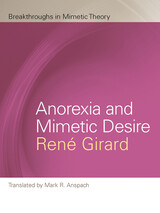3 books about Anorexia

Abject Relations
Everyday Worlds of Anorexia
Warin, Megan
Rutgers University Press, 2009
Abject Relations presents an alternative approach to anorexia, long considered the epitome of a Western obsession with individualism, beauty, self-control, and autonomy. Through detailed ethnographic investigations, Megan Warin looks at the heart of what it means to live with anorexia on a daily basis. Participants describe difficulties with social relatedness, not being at home in their body, and feeling disgusting and worthless. For them, anorexia becomes a seductive and empowering practice that cleanses bodies of shame and guilt, becomes a friend and support, and allows them to forge new social relations.
Unraveling anorexia's complex relationships and contradictions, Warin provides a new theoretical perspective rooted in a socio-cultural context of bodies and gender. Abject Relations departs from conventional psychotherapy approaches and offers a different "logic," one that involves the shifting forces of power, disgust, and desire and provides new ways of thinking that may have implications for future treatment regimes.
[more]

Anorexia and Mimetic Desire
René Girard
Michigan State University Press, 2008
René Girard shows that all desires are contagious—and the desire to be thin is no exception. In this compelling new book, Girard ties the anorexia epidemic to what he calls mimetic desire: a desire imitated from a model. Girard has long argued that, far from being spontaneous, our most intimate desires are copied from what we see around us. In a culture obsessed with thinness, the rise of eating disorders should be no surprise. When everyone is trying to slim down, Girard asks, how can we convince anorexic patients to have a healthy outlook on eating? Mixing theoretical sophistication with irreverent common sense, Girard denounces a “culture of anorexia” and takes apart the competitive impulse that fuels the game of conspicuous non-consumption. He shows that showing off a slim physique is not enough—the real aim is to be skinnier than one’s rivals. In the race to lose the most weight, the winners are bound to be thinner and thinner. Taken to extremes, this tendency to escalation can only lead to tragic results. Featuring a foreword by neuropsychiatrist Jean-Michel Oughourlian and an introductory essay by anthropologist Mark R. Anspach, the volume concludes with an illuminating conversation between René Girard, Mark R. Anspach, and Laurence Tacou.
[more]

Body Story
Julia K. Depree
Ohio University Press, 2004
Something other than a memoir of a life well lived, Body Story conveys Julia K. De Pree's troubling journey from adolescence to adulthood and from anorexia to health.
For De Pree, between being a girl and being a woman, there was starvation. Body Story is her intimate account of girlhood, virginity, anorexia, and motherhood. De Pree's prose is spare and unguarded, revealing in vivid flashbacks and poignant vignettes the sources of her inner pain.
In high school, the five-foot-ten De Pree weighed as little as 114 pounds. She was too weak to raise her arms above her head. “In a paradoxical way, I starved my body in order to understand my life,” she writes. “I had to place my body in suspension before I could move physically into sexuality. Starving allowed me to create an interim space between innocence and experience.”
De Pree renders the starkness of anorexia along with the process of recovery, relapse, and, ultimately, redemption. She also tells the story of the physical landscape, from her origins in the Midwest to the American South, Paris, and the vast New Mexican desert, as well as the psychic landscape of her body as it encounters the joys and challenges of maturation, childbirth, and motherhood.
De Pree offers readers a new way of understanding women¿s bodily experience, as she writes about the mystery and the meaning of her illness. As many as eight million Americans suffer from eating disorders. Body Story, unlike clinical reports or news accounts, illuminates the complexity of anorexia as the narrative moves toward a subjective and deeply personal truth.
This evocative and often radiant vision is a unique window into womanhood and selfhood in middle-class, contemporary America.
For De Pree, between being a girl and being a woman, there was starvation. Body Story is her intimate account of girlhood, virginity, anorexia, and motherhood. De Pree's prose is spare and unguarded, revealing in vivid flashbacks and poignant vignettes the sources of her inner pain.
In high school, the five-foot-ten De Pree weighed as little as 114 pounds. She was too weak to raise her arms above her head. “In a paradoxical way, I starved my body in order to understand my life,” she writes. “I had to place my body in suspension before I could move physically into sexuality. Starving allowed me to create an interim space between innocence and experience.”
De Pree renders the starkness of anorexia along with the process of recovery, relapse, and, ultimately, redemption. She also tells the story of the physical landscape, from her origins in the Midwest to the American South, Paris, and the vast New Mexican desert, as well as the psychic landscape of her body as it encounters the joys and challenges of maturation, childbirth, and motherhood.
De Pree offers readers a new way of understanding women¿s bodily experience, as she writes about the mystery and the meaning of her illness. As many as eight million Americans suffer from eating disorders. Body Story, unlike clinical reports or news accounts, illuminates the complexity of anorexia as the narrative moves toward a subjective and deeply personal truth.
This evocative and often radiant vision is a unique window into womanhood and selfhood in middle-class, contemporary America.
[more]
READERS
Browse our collection.
PUBLISHERS
See BiblioVault's publisher services.
STUDENT SERVICES
Files for college accessibility offices.
UChicago Accessibility Resources
home | accessibility | search | about | contact us
BiblioVault ® 2001 - 2024
The University of Chicago Press









